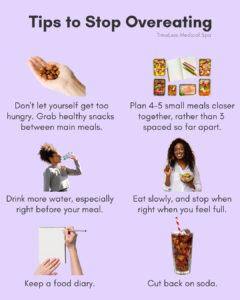Do you ever keep eating even when your are full? Do you feel pressured to eat more in a social situation? Do you turn to food to ease your stress?
If so, you are not alone. Overeating is a very common struggle.
According to the CDC more than 1 in 3 of American adults suffer from obesity. The National Institute of Diabetes and Digestive and Kidney Diseases reports that 1 in 20 adults are morbidly obese. While studies do show that genes, family history, diseases and syndromes can contribute to significant weight gain, common factors are often overeating and environmental.
So, why are we overeating?
Is it the overwhelming stress of 2020? Is it because we are repeatedly blasted with fast food ads on television and radio? Is it the decadently delicious dessert recipes filling our Facebook feeds and Pinterest boards? Is it the donuts in the break room at work and other social situations that focus on food? Is it that, as a nation, we are consuming more added sugars than ever before, increasing our portions and eating more meals from the drive-thru?
Truthfully, there are many contributing factors to study when it comes to what is causing us to overeat.
Stress
According to the 2020 American Psychological Association survey, the average reported stress level for American adults is 5.4. The report states, “This is significantly higher than the average stress level reported in the 2019 Annual Stress in America survey, which was 4.9, and marks the first significant increase in average reported stress since the survey began in 2007.” This year has been and is becoming increasingly stressful each day. We are trying to manage more and adjust to more changes than ever before. Not to mention, the overwhelming amount of information and viral content that is hurled at us through social media.
So, how does stress make us overeat? Initially, the nervous system sends orders to the adrenal glands to start producing the hormone epinephrine. Epinephrine triggers the body’s fight-or-flight response, which puts hunger and eating on hold. However, if the stress persists (we’re looking at you, 2020), then the adrenal glands release cortisol. Cortisol causes an increase in motivation and appetite.
Alcohol
According to a study published in the American Journal of Clinical Research, Alcohol is a bigger contributor to overeating than any other factor. Scientists found that drinking increases the hormone levels that makes you feel hungry.
Sleep Deprivation
The University of Chicago performed a study, which showed that people who slept 5.5 hours ate 221 more snack calories than those who slept for 8.5 hours. People often use sugary and caffeinated beverages for energy after a less-than-restful night.
Food Ads
Every where you turn are food ads. The brain’s reward centers light up when people view images of food, causing the desire to overeat. So, we’re now we’re hungry and reaching for food quickly. Where do we go? Fast food. Unfortunately, we can easily get a high number of calories for very little cost, and when they advertise it that way we are hooked. Why not “super-size” for 50 cents more? It’s quite hard to argue with a 40 ounce Big Gulp and a jumbo hot dog for only two dollars, or a medium pizza with 8-piece hot wings for less that 10 bucks.
Soda
According to The Center for Science in the Public Interest, the average American drank just over 38 gallons of soda in 2013. That’s about 8 12-ounce cans per week. A typical 12-ounce can of regular cola contains nearly 9 teaspoons of added sugars, while The American Heart Association recommends a maximum daily intake of six teaspoons of added sugars for women and nine teaspoons for men. Soda leads to overeating and weight gain more than solid foods, because the brain’s satiety centers don’t register the calories.
Social Eating
How often have you found yourself eating more food, just because everyone else is? We attend social gatherings, work parties and events that surround refreshments and encourage overeating. Studies have proven that people often mimic each other’s eating behaviors. In fact, the Journal of Social and Clinical Psychology published a particular study that found college students were more likely to eat M&Ms when another person offered them some.
“Mismatched” Brains
A Nutrition Action Healthletter article explores these problems and solutions. Ashley Gearhardt, assistant professor of psychology at the University of Michigan, suggests that we struggle to say no to overeating and food advertisements, because “the human brain evolved in a time where food was scarce. So, it’s been optimized over the course of evolution to respond to food cues, and in particular to react to calorie-dense food.” Gearhardt explains that there is a “mismatch” between our old brains and the world of easily accessible food. The signals from our guts to our brains that indicate we’re getting full are also much slower and more subtle than our reward signals stemming from sugar and calorie-dense foods.
So, what can we do to change this?
Gearhardt suggests what may help combat this:
Don’t let yourself get too hungry, and stay away from crash diets.
Make healthy snack choices. Eat fresh fruits and vegetables, light proteins and healthy fats between meals so you never feel ravenous at meal time.
Don’t drink your calories. Start decreasing your intake of sugary drinks and sodas.
Drink more water. We know, it’s like we use this answer for everything, but it totally applies. Drink plenty of water throughout the day and right before a big meal to help with digestion and control how much you consume.
Find other ways to address your stress, than responding to emotions with indulging cravings. Go for a walk, do yoga, or take a nap.
Get more sleep. Try to maintain a routine for going to bed and getting up at the same time each day.
Give yourself a break. Gearhardt empathizes, “I ask people to have some compassion for themselves, because it is really hard. Our food environment is set up to make it hard for people to eat healthier.” Making healthy choices isn’t easy at first, but can become habit with time and consistency. We can slowly begin to make choices and changes to start fighting obesity.
At TimeLess, we also suggest meal planning and keeping a food diary. Planning 4-5 small meals, rather than 3 spaced so far apart means you never let yourself get too hungry. Prepping meals ahead of time keeps you from indecision and grazing. Keeping a food diary helps you track your meals and stay accountable. This way you know if your are ever eating too much or not enough.
Joining the TimeLess Medical Weight Loss program in Ogden, UT is a great way to take control of your health, and learn more about how to heal your relationship with food. Not only do we focus on diet; we work on habits like stress eating. Call 801-475-4300 to learn more.
Sources:
Centers for Disease Control and Prevention. (n.d.). Overweight & Obesity. Retrieved from CDC: https://www.cdc.gov/
Liebman, B. (2017, April). What Makes Us Eat Too Much. Nutrition Action Healthletter, 3-6.
https://www.apa.org/news/press/releases/stress/2020/report
https://www.health.harvard.edu/staying-healthy/why-stress-causes-people-to-overeat








